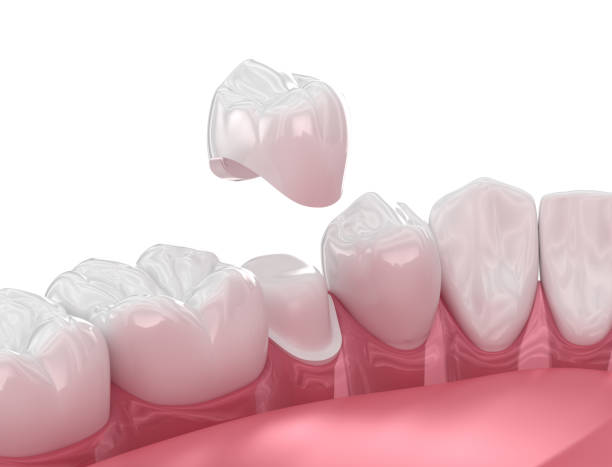Right Now
Which Dental Crown Material Is Better?

Dental crowns are one of the most efficient ways to restore a broken tooth in esthetic dentistry. Whether you're looking to protect a weak tooth, improve aesthetics, or cover a dental implant, selecting the proper crown material is critical for longevity, function, and beauty. With so many materials available, including porcelain, zirconia, metal, and composite, it's critical to grasp the distinctions. This information will help you decide which crown material is appropriate for your dental requirements.
Understanding Dental Crowns and Their Purpose
A dental crown is a custom-made cap that fits over a broken or weakened tooth to restore its shape, strength, and function. Crowns can also be used to cover dental implants, providing a natural-looking and long-lasting solution for missing teeth. Crowns are often advised for:
Strengthening a tooth following a root canal;
Protecting a fractured or heavily worn tooth;
Covering a discolored or malformed tooth for cosmetic purposes;
Serving as the visible component of a tooth dental implant.
Patients can benefit from a robust, functional, and aesthetically acceptable repair if the crown material is chosen correctly.
Types of Crown Materials
Each crown material has benefits and drawbacks, depending on where the crown is put, durability requirements, and esthetic preferences. Let us take a deeper look at the most prevalent possibilities.
Porcelain Crowns (All Ceramic Crowns)
They are a popular alternative for front teeth since they have a natural, tooth-like look. These crowns mirror the translucency of natural teeth and are stain-resistant, making them perfect for cosmetic dentistry. Porcelain crowns are biocompatible and an excellent choice for those with metal allergies. However, they are not as robust as metal or zirconia crowns, therefore they may not be suitable for back teeth that require a lot of biting power.
Zirconia Crowns
Zirconia crowns provide a blend of durability and beauty. These crowns are exceptionally durable, wear-resistant, and may be color-matched to blend in with natural teeth. Zirconia is frequently recommended for back molars owing to its resilience, giving it an ideal choice for individuals who seek a long-lasting replacement. However, zirconia crowns are more opaque than porcelain crowns, so they may appear less natural. If not adequately polished, they might eventually create wear on adjacent teeth.
Metal Crowns (Gold or Base Metal Alloys)
These are the most durable alternative and commonly utilized for rear molars with significant chewing pressures. They need less destruction of the original tooth structure, making them a more conservative option for restorations. Metal crowns are resistant to chipping and shattering, resulting in a long lifespan. However, their metallic appearance makes them unsuitable for visible teeth, and some individuals may have allergic responses to metal alloys.
Crowns Made of Porcelain Fused to Metal (PFM)
Combine the durability of a metal foundation with the natural look of a porcelain exterior. This makes them an excellent alternative for people seeking both durability and tooth-colored restorations. While PFM crowns are less expensive than all-porcelain or zirconia crowns, the metal layer may become evident with time, resulting in a dark line near the gums. Additionally, they may cause greater wear on adjacent teeth than other crown materials.
Composite Resin Crowns
Composite resin crowns are a cost-effective choice for interim restorations. These crowns may be color-matched to the teeth and provide a natural look. However, they are less durable than porcelain, zirconia, or metal crowns, and are more prone to discoloration and wear. Because of their limited lifespan, composite crowns are frequently advised for individuals who require a temporary solution before acquiring a permanent crown.
How to Select the Right Crown Material For You
The optimum crown material is determined by various criteria, including where the crown will be put, your aesthetic choices, durability needs, and budget. Porcelain crowns are good for front teeth because they have a natural appearance, whereas zirconia or metal crowns give strength for molars that are subjected to intense chewing. PFM crowns strike a nice mix between durability and beauty, however they may develop a noticeable metal edge over time. Composite crowns can be used as a temporary treatment for people on a tight budget or who are waiting for a more permanent repair.
For patients getting dental implants, choosing the proper crown material is just as crucial as choosing the implant itself. Because dental implants are intended to last a lifetime, the crown that sits on top should be robust, durable, and aesthetically beautiful. The most frequent crowns used for dental implants are zirconia and porcelain, which provide both strength and a natural look. Your dentist will examine your bite, lifestyle, and cosmetic objectives before recommending the best crown material.
More Posts





Report This Post
Please complete the following requested information to flag this post and report abuse, or offensive content. Your report will be reviewed within 24 hours. We will take appropriate action as described in Findit terms of use.



